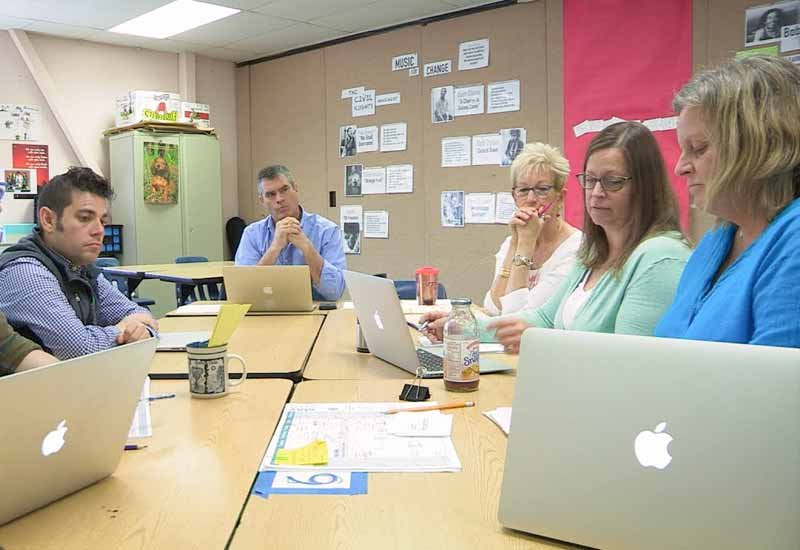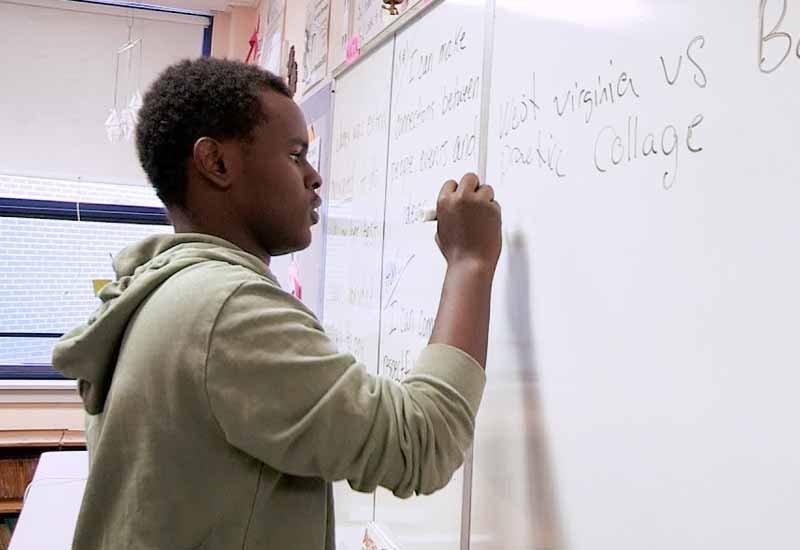
Resource Library
Use the filter options below to find the resources you are looking for.
Gallery | List
Why Optimism Is Your Superpower (And How To Unlock It In 5 Easy Steps)
A Forbes article by Talia Milgrom-Elcott, leader of Beyond100K, highlights the science of optimism and how it can transform lives. Quoting Pamela Cantor, M.D., the article describes the link between our actions and biological resilience, emphasizing a commitment to meaningful steps that unlock human potential.
Pamela Cantor, M.D. Explains The Biology of Learning and Its Link to Belonging
Pamela Cantor, M.D., explains the biology of learning and its connection to belonging in this video from History Co:Lab as part of the Building Belonging Project, a product of the Jacobs Foundation and New America’s Learning Sciences Exchange (LSX) fellowship.
Pamela Cantor, M.D.’s Call to Action: Measuring What Truly Matters for Learning and Development
Eric Tucker reflects on Pamela Cantor, M.D.’s keynote at the Advancing Artificial Intelligence, Measurement and Assessment System Innovation Summit. Like scientific revolutions of the past, Dr. Cantor contends that we need a paradigm shift in understanding and measuring human learning and development.
Optimism Is A Natural Anti-Anxiety Med. Here’s How It Works.
In a world where uncertainty seems to be the only constant, maintaining a positive outlook is more crucial than ever. A Forbes article by Talia Milgrom-Elcott, leader of Beyond100K, delves into the power of optimism as a solution to 2024's complexities and challenges and shares insights from Pamela Cantor, M.D.
Building Blocks for Learning
A framework for the development of skills children need for success in school and beyond.
How to Gain ‘Magic Muscles’ After Pandemic Learning Loss
The struggle to overcome learning loss and build resiliency.
Learning and the Brain Conference Spring 2023
In a keynote speech, Pamela Cantor, M.D. explores how human connections wire the brain and fuel learning.
April 21-23, 2023Notes from the Backpack
National PTA Podcast, featuring Pamela Cantor, M.D., on how to help your child through crises.
Helping Young People Achieve Peak Performance
Every human skill in every person has a developmental range, but the sad fact is that most of us never get to explore the upper limits, whether in classrooms, in sports, or in the arts.
Using Science to Imagine a New Purpose and Design for Education
New research in youth and adolescent development and what it means for creating learning contexts that truly support and nurture the whole child.
The 180 Podcast | Renee Prince: Educators as First Responders to the Youth Mental Health Crisis
Renee Prince, a licensed clinical social worker (LCSW), leverages research and trends in the mental health field to ensure that Turnaround for Children’s (now the Center for Whole Child Education at ASU) tools and services are informed by current clinical knowledge of trauma-informed practices.
The 180 Podcast | LaShawn Routé Chatmon and Kathleen Osta: What Is an Equitable Learning Environment and How Can Your School Build One?
Does an environment that is equitable for one child necessarily mean it becomes unequitable for another? Where is the balance, and how does it get struck?
Whole-Child Development, Learning, and Thriving
How children develop through a system of dynamic relationships and the collective set of contexts that they experience across their life spans.
The 180 Podcast | P.S. 340: Getting to Know How Students Are Feeling and Functioning
Diana De Corte and Alexei Nichols on how Turnaround for Children's Well-Being Index works at their K-5 school in the Bronx.
The 180 Podcast | Christina Theokas: The Well-Being Index
Christina Theokas explains why Turnaround for Children developed its Well-Being Index.
The 180 Podcast | Margaret Beale Spencer: What Makes Some People Vulnerable and Others Resilient? (Part 1)
Part 1 of a conversation with Margaret Beale Spencer about human vulnerability, resilience and context, which are concepts that Professor Spencer, University of Chicago, has spent her career studying and addressing.
Developing Confidence with Delayed Grading
Giving students time to explore ideas with no immediate grade pressure helps motivate them to be creative and take intellectual risks.
Building a Belonging Classroom
In order to learn, students need to feel safe, cared for, and emotionally connected to their teachers and each other.
Motivating Students with Book Choice
Letting students choose books to read helps them develop a sense of autonomy and ownership over their learning.
Knowing Every Child through Index Card Rosters
By regularly reviewing students’ behavior and learning as a team, teachers can ensure that every student is seen, supported, and celebrated.
Cultivating Trust with One-on-One Time
For many struggling students, consistently spending informal time with a trusted educator supports emotional well-being and academic growth.
Making Connections with Greetings at the Door
Research shows that greeting students as they come into class bolsters a feeling of belonging and readiness to learn.
The Power of Relationships in Schools
Research shows that students who feel safe and supported by adults at school are better able to learn.
Boosting Engagement with Notices and Wonders
When students make “I notice” and “I wonder” comments on course content, teachers can see what they know—and what they need to learn.
Fostering Belonging with Classroom Norms
When students help create their classrooms' rules and culture, they’re more engaged and invested in learning.
Getting Started with Trauma-informed Practices
When teachers use strategies tailored to children who have experienced trauma, all students reap the emotional and academic benefits.
Getting Ready to Learn with Mindfulness
Research shows that taking some time each day to practice mindfulness as a class helps students prepare themselves for learning.
Activating the Brain with Movement Breaks
Research shows that taking some time each day to practice mindfulness as a class helps students prepare themselves for learning.
Demonstrating Self-Regulation with Tone of Voice
When teachers model self-regulation by using a voice that is calm, neutral, and assertive, they help students feel cared for—and ready to learn.
Developing Executive Function Skills with Priority Lists
Explicitly modeling the process of prioritizing tasks builds students’ ability to organize and manage their time.
Teaching Self-Regulation Through Modeling
The key is giving students the decision-making tools they need to shape their own learning experiences.
Scaffolding Discussion Skills With a Socratic Circle
Students deepen their understanding and build a sense of community by engaging with their peers’ reasoned arguments.
Encouraging Academic Conversations with Talk Moves
Sentence starters that students use to join a class discussion encourage both academic thinking and social connectedness.
Drivers of Human Development: How Relationships and Context Shape Learning and Development
A synthesis of the role of relationships and key macro and micro-contexts—poverty, racism, families, communities, schools, and peers—in supporting and/or undermining the healthy development of children and youth, using a relational developmental systems framework.
Malleability, Plasticity, and Individuality—How Children Learn and Develop in Context
A synthesis of foundational knowledge from multiple scientific disciplines regarding how humans develop in context.
NBC News Education Nation Summit
NBC News' Hoda Kotbe interviews Pamela Cantor, M.D., actress Goldie Hawn, Superintendent Dr. Meria Joel Carstarphen, and Principal Peter DeWitt on what it takes to build safe and supportive schools.
Psychopathology among New York City public school children 6 months after September 11
Children exposed to a traumatic event may be at higher risk for developing mental disorders.







































